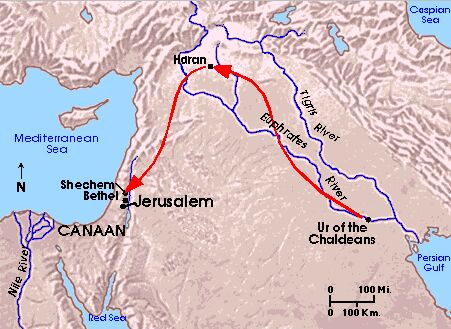 |
| This map is really showing Abraham's early journey, but you can see how Jacob is back-tracking on a similar path, leaving Canaan to go to Paddan Aarm, near Haran. |
Genesis 28
After
Jacob’s deceit, Esau is not happy, and at the end of the last chapter he
threatens to kill Jacob, just as soon as their father dies. Rebekah asks Isaac
to send Jacob away, to keep him alive as well as out of the hands of a Hittite
wife (remember the disdain for Esau’s Hittite wives).
Genesis
28: 6-9, NIV Now Esau learned that Isaac
had blessed Jacob and had sent him to Paddan Aram to take a wife from there,
and that when he blessed him he commanded him, “Do not marry a Canaanite
woman,” and Jacob had obeyed his father and mother and had gone to Paddan Aram.
Esau then realized how displeasing the Canaanite women were to his father
Issac; so he went to Ishmael and married Mahalath, the sister of Nebaioth and
daughter of Ismael son of Abraham, in addition to the wives he already had.
Poor
Esau. He doesn’t seem to be the sharpest tool in the shed. He only now realizes
that his family did not want him to marry Canaanite women? It strikes me that
this is a concept that Rebekah would have drilled into him growing up.
Interesting to note, that back in chapter 25, Mahalath is not mentioned in
Ishmael’s geneaoloy, presumably because she is a daughter and not a son.
Some
rabbis believe that Esau’s marriage to Mahalath reflected his desire to repent
of his wayward deeds and act in accordance with Isaac and Rebekah’s wishes.
Another view would be that Esau married the daughter of Ishmael, and conspired
with his father-in-law (another jilted son in the clan of Abraham) to kill
Isaac. This theory is based on the fact that Esau does not divorce his two
Hittite wives when he marries Mahalath.
Jacob's Irreverence
Genesis 28:10-12,
NIV Jacob left Beersheba and set out for
Haran. When he reached a certain place, he stopped for the night because the
sun had set. Taking one of the stones there, he put it under his head and lay
down to sleep. He had a dream in which he saw a stairway resting on the earth, with
its top reaching to heaven, and the angels of God were ascending and descending
on it.
I found
the note to accompany Gen. 28:12 in my NIV Student Bible interesting, and will
include it here:
28:12 A
Stairway to Heaven
God’s
grace: this is what Jacob found while traveling alone in the desert. Through
his own greedy scheming he had won the family birthright and then, ironically,
had had to run away from the family. Yet God came to him full of promises, not
the reproaches he deserved. Jacob had not looked for God, but God looked for
him. Jacob’s vision of a stairway to heaven looked forward to Jesus, who
himself is the bridge between heaven and earth.
I find it
interesting how so many aspects of the Old Testament are tied in to Jesus. And
in my opinion, this verse is more a sign that the author held to the belief
that the sky was solid, and Heaven was directly above the earth.
I have a
hazy recollection of the Jacob and Esau storyline from childhood, and I truly
thought that when God appeared, at the very least he would chastise Jacob for
his deceptions. But there is no punishment, no mention of his behavior. In
fact, he is rewarded. Compare that to the destruction of Sodom and Gomorrah,
and particularly Lot’s wife, who made one tiny mistake. I can’t quite
understand the reasoning for this story, as a myth or as “truth”.
At the end
of the chapter Jacob anoints a rock (yes, you heard that right) with oil, and
proclaims its future purpose as a pillar of God’s house. I’m curious to see if
this rock makes a reappearance in future stories.
I will
end with one of the craziest verses in an overall crazy chapter.
Genesis
28:20-22, NIV Then Jacob made a vow,
saying, “If God will be with me and
will watch over me on this journey I am taking and will give me food to eat and
clothes to wear so that I return safely to my father’s house, then the Lord
will be my God and this stone that I have set up as a pillar will be God’s
house, and of all that you give me I will give you a tenth.”
I
honestly don’t see how you can take this seriously. Jacob is essentially
bribing God. Well, I will only follow you if you give me everything I want. It’s
ridiculous and laughable. Jacob sets out requirements that have to be met before
he will follow God, but Christians are expected to follow on blind faith?
New Words:
Paddan Aram
– an early Aramean kingdom in Mesopotamia. In Aramaic, it means the field of
Aram. I could not find any information about Paddan Aram outside of the Bible.
No comments:
Post a Comment